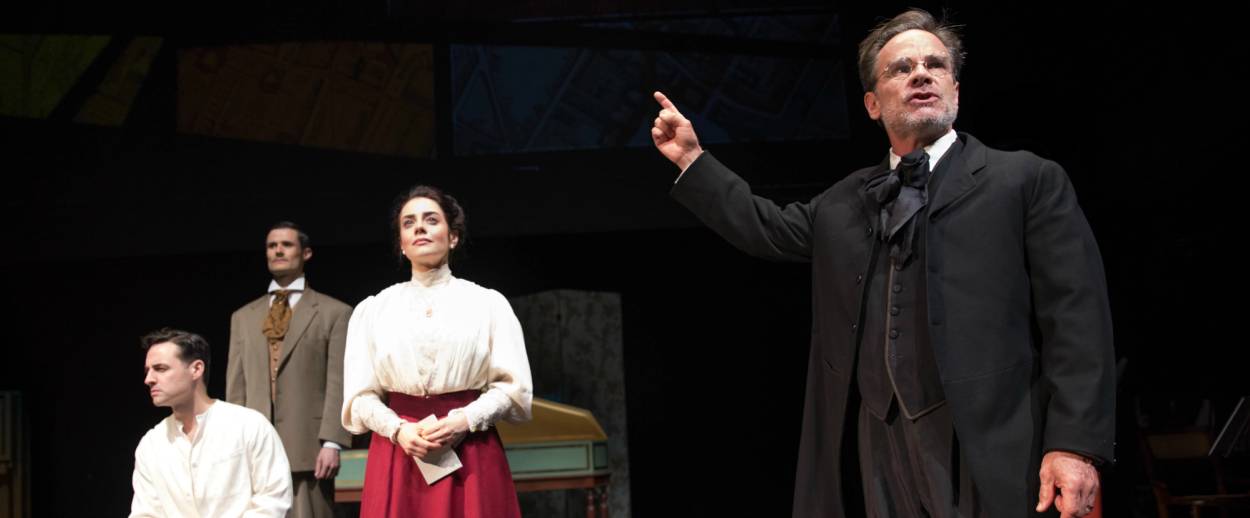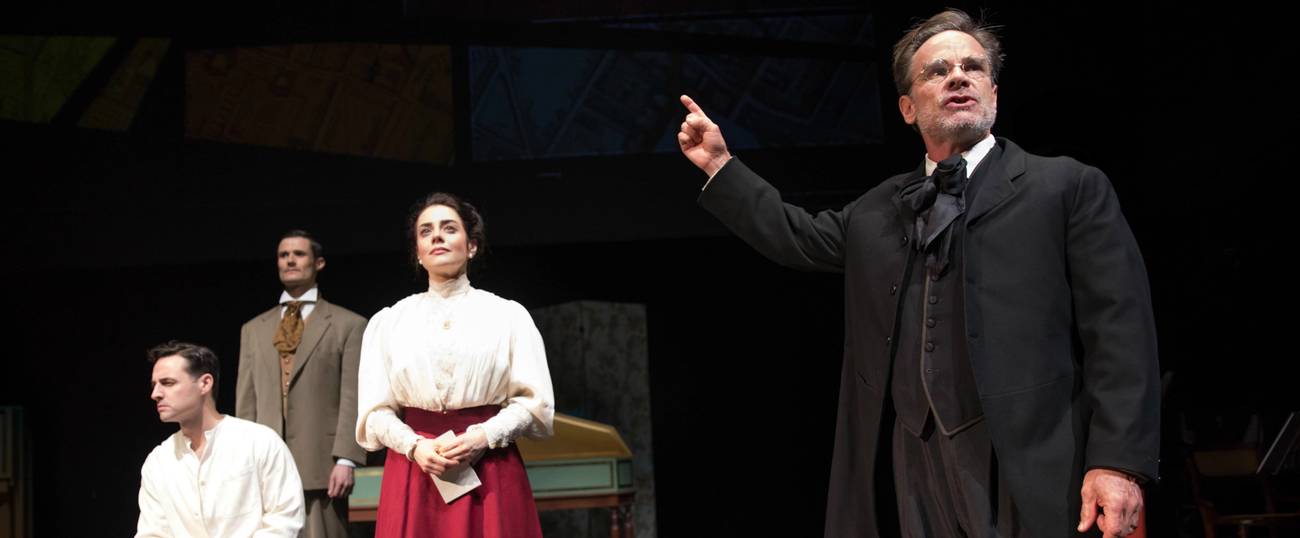The Holocaust as Prop
Featuring the Shoah onstage is important, but there are risks involved




It should come as no surprise that a show called The Dreyfus Affair, which just finished its run at the Brooklyn Academy of Music, would make for a rather somber evening—the telling of the story of the French Jewish officer framed for espionage at the turn of the 20th century can do that. But one of the music drama’s most surprising details comes from the play’s end: a scene about the Holocaust.
It is true that Alfred Dreyfus’s widow, Lucie, survived the Shoah, hiding as a nun in a French convent until the liberation of Paris (she died soon after). But the play lingers on her for quite some time, stooped and old in her habit, knitting while crying silently. Since European anti-Semitism is the focus of the work overall (there’s even one ominous warning from Émile Zola about where all this bigotry is headed), this moment seems to say, “We told you so,” as video-projected text goes more into detail about the 1940s, years after Alfred Dreyfus himself had died.
To say there’s nothing more sacred to the identity of American Jews than the Holocaust may not be much of a stretch, according to that pesky Pew study. And several shows in New York this season by Jewish writers highlight that fact, sometimes uncomfortably.
This very statistic is played out onstage this season in Steven Levenson’s frustrating If I Forget, where the Norman Finkelstein-esque protagonist has written a book titled Forgetting the Holocaust, to the consternation of his family. What ensues is a rather tired debate about anti-Semitism and Jewish identity, and there are no winners. The academic wants to shake off the specter of the tragedy that he thinks gives American Jews a martyr complex, which some members of his own family exhibit, and of course, it all ties in to Israel. (The Dreyfus Affair also finds it necessary to remind us that the State of Israel was founded in 1948.)
It’s fraught territory, of course, dealing with the magnitude of the Holocaust, a task that feels like it should be perpetual, and parsing out other anti-Semitic conflicts throughout the centuries, and celebrating Jewish culture and accomplishments independent of persecution.
Take this year’s Best Play nominee, Indecent, on the whole an amazing work by Paula Vogel about Sholem Asch’s The God of Vengeance, which focuses on the obscenity lawsuit it faced in 1923 (the play originally featured a lesbian kiss). The lawsuit was in part grounded in anti-Semitism against immigrants and their foreign cultural influences, and Asch himself was distraught during this time because of post-WWI violence against Jews in Europe. But (spoilers, as it were) Indecent follows the play’s significance all the way through the 1950s, and because the central figures were largely immigrants to America, invents a major character to send back to Europe just as skies are darkening. The ensuing Holocaust sequence is powerful, and certainly less exploitative than in The Dreyfus Affair, but it’s a matter of opinion whether or not this story of Jewish cultural struggle needs to include the liquidation of a ghetto.
Jesse Green over at Vulture (before his departure for The New York Times) makes an apt point: “I have a problem with plays, however well-intentioned, that hitch their wagon of importance to the Holocaust.”
It’s funny, then, that the best illustration of how to manage the unmanageable trope of the Holocaust this season is in a show that is on the whole quite flawed. In War Paint, Helena Rubinstein is a Polish-Jewish immigrant, safely in the United States years before the war begins (like Indecent). But the scope of the musical has to include the 1940s, and it would be an elephant in the room to ignore what was happening to Rubinstein’s people overseas. Patti LuPone’s Rubinstein is not one to play the victim, so, there is a quick scene in which Rubinstein learns that the Warsaw Ghetto has been erected, and she makes a statement to her European servant about showing what “we” are made of. She springs into action to get her family out of Europe, and also to use her makeup empire to help in any way she can.
This moment adds more weight to Rubinstein’s determination to aid the war effort, and is one of the few moments of the show where her career motivations are about more than outdoing her rival, Elizabeth Arden. And then the play moves on, with the march of time, because Rubinstein’s life, even as a European Jew whose people were at risk of obliteration, is about more than that. And this moment of acknowledging the fearful shadow of the Shoah doesn’t detract from the anti-Semitism Rubinstein faces in the States, though her physical safety is not at risk. She faces social and financial discrimination, which is its own animal, in its own context.
The Holocaust as a passage in Jewish history can be an exhausting burden to bear. This doesn’t mean it’s sacrosanct to invoke in art, but it also doesn’t mean it should be used as a convenient prop, an undeniable example that the fear that Jews feel even today is justified. In fact, it holds the risk of making the Shoah look like a culmination of anti-Semitic sentiment that has reached its natural conclusion. Now, the Promised Lands of America and Israel risk standing in as salvation from our past—as if our own history is something to be feared.
Gabriela Geselowitz is a writer and the former editor of Jewcy.com.